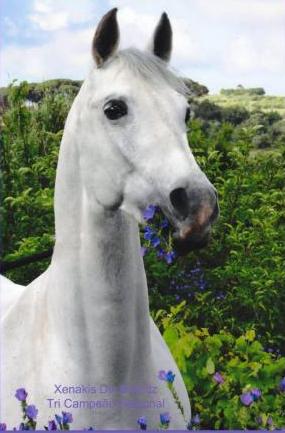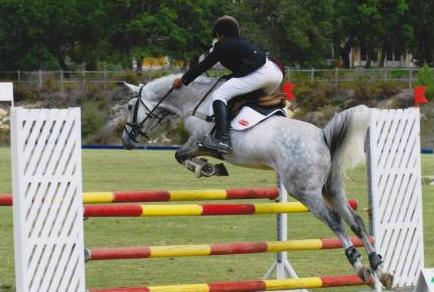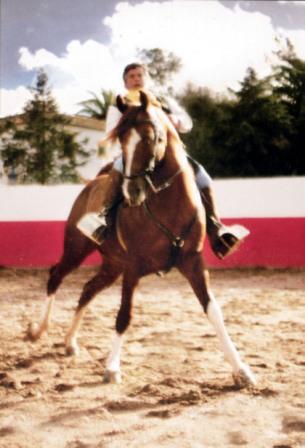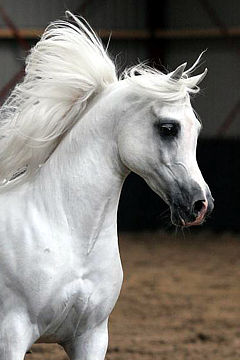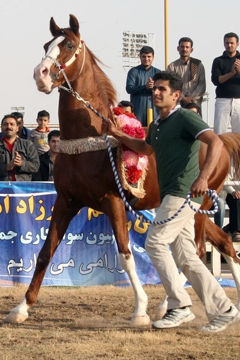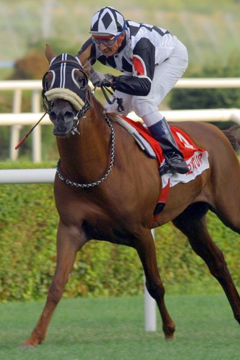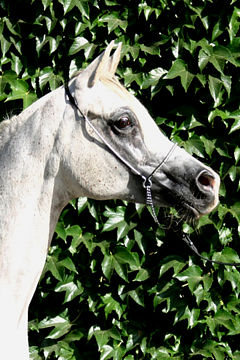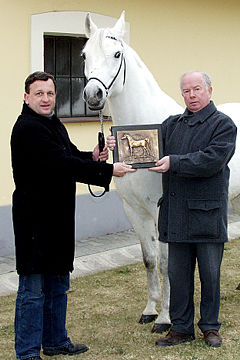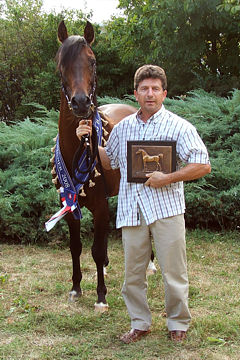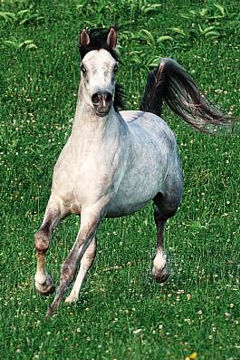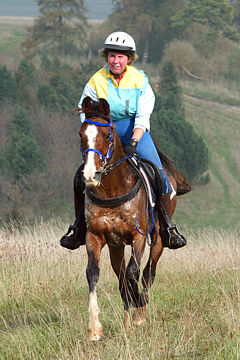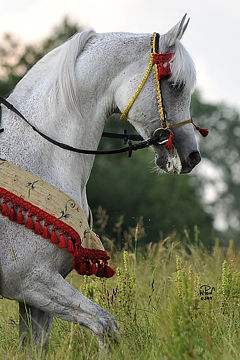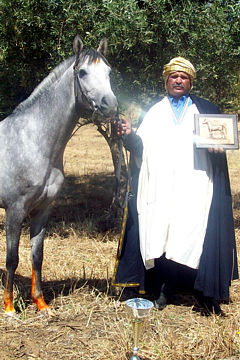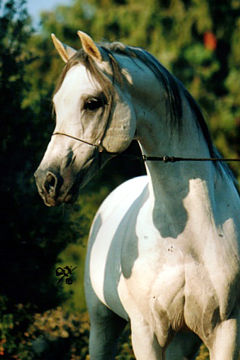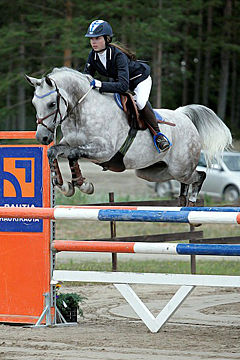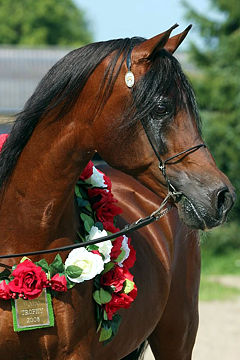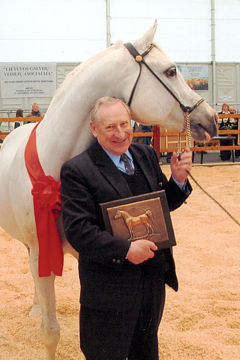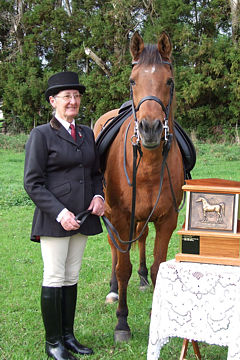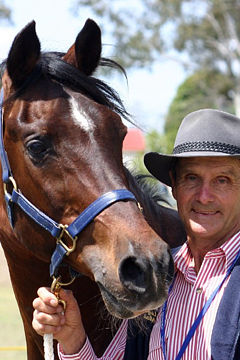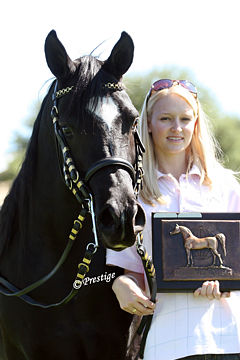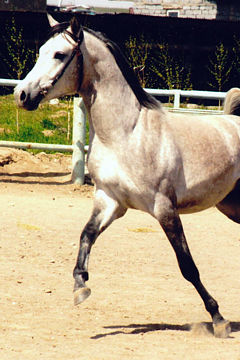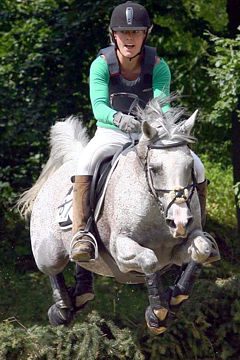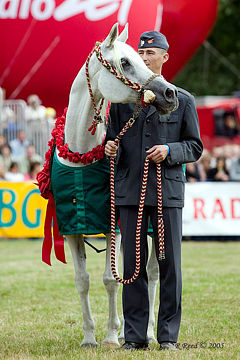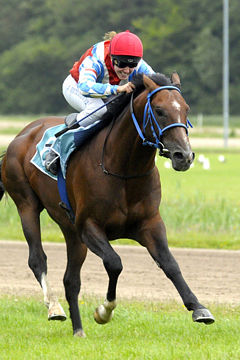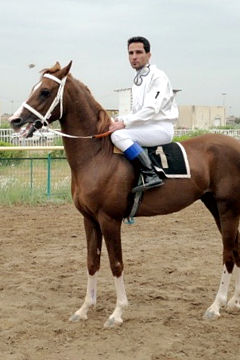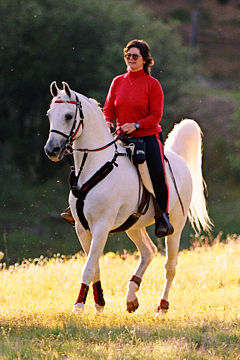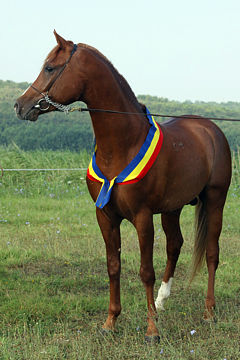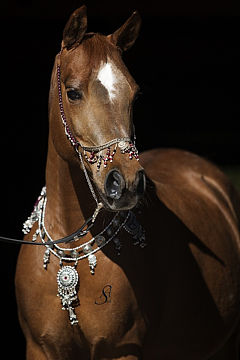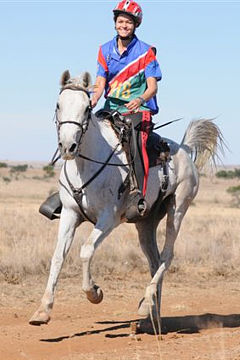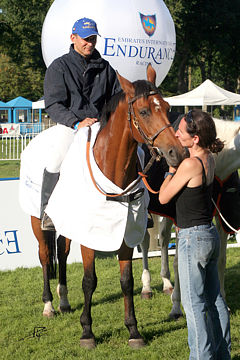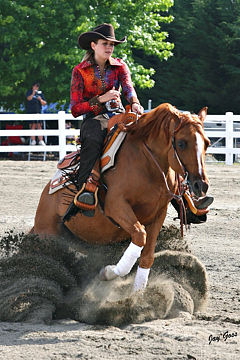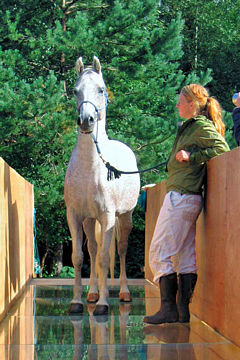![]()
Member Report from Portugal
REPORT FROM THE 2019 WAHO CONFERENCE:
Luis Lamas, Portugal: Mr. President, Members of the Executive Committee, dear colleagues, I want to thank also the Arabian Horse Society of Australia for hosting this meeting and I extend my thanks to the Conference organising team that has been outstanding.
My name is Luis Lamas, I am the President of the Portuguese Arab Horse Association that is owned by our members and is supported by them. Although we act as delegates of our government, we are totally independent and receive no financial support from the state, this means that we work for our members that support us and we also work to promote the Arab horse breeding in our country. Since our last General Assembly we have worked hard to develop our Association, promoting several activities with emphasis on our annual endurance competition for young Arab horses that is at limited speed and controlled, and this competition allows our members to promote and expose at no cost for them their young Arab horses. We will also award this year the WAHO trophy in 2019 and we are also expecting to have the first horse races for Arabian horses. We are working hard to update our stud book, unfortunately we were not able to do it before this assembly, but we will do it very soon.
Portugal has a long tradition of breeding Arabian horses but unfortunately due to several factors, of course the economic factor is also important, the breeding activities have not developed as much as we would like. Last year we had only 23 foals registered, that is very low, but on the other hand the number of breeders has grown. This is why we believe that our Association and all our breeders will grow in this year and in the next years, as the activities for 2019 are also encouraging and are developed in the frame of the World Arabian Horse Organization. Thank you for your attention.
REPORT AT THE 2017 WAHO CONFERENCE:
Luis Lamas, Portugal: Thank you Mr. Vice- President we want also to thank His Majesty the King for the Patronage of this meeting and the Executive Committee of WAHO for this fantastic organisation.
The Portuguese Association of Arab Breeders is owned by our own members and supported by them. Over the last few years we have had some difficulties with the illness of our past President and the new directors were elected recently, in the past year. My name is Luis Lamas, I am the President of the Association and my colleague Dr. Antonio Vaz-Freire is responsible for all the registration matters in Portugal and we have started the work furthering our main objectives. Our first is to increase the number of members of our Association, we already were able to go from 59 to 82 and we expect to have 100 by the end of 2018. We also plan to update the Portuguese stud book and have it included in the new website, and we want to promote in all possible ways the Arabian horses in Portugal, a country that has a long tradition of raising Arabian horses.
We organise endurance promotional competitions only for promotion, not really for competition but for small distances and we also organise what we call ‘Endurinio’ which is a small competition for young children with their families to start getting acquainted with horses and with these types of competition.
As I told you Portugal has a long tradition of breeding horses and this was also affected in the last years by the crisis we have been going through, now things are improving. New and younger breeders are starting their studs and that is why we believe we will grow and the number of foals already has raised in the last 2015 from 50 to 60 in the next year. That is not much, but for us it is significant. The Portuguese Government has one department to certify the results of the blood and the DNA of all the horses and all of them are identified by microchips. These results are available in a database shared by the Government with us, with our Association, and that is why we hope to be capable to update and publish our studbook at the end of this year. Thank you very much for your attention.
REPORT AT THE 2011 WAHO CONFERENCE:
Dr. Manuel Domingues-Heleno, Portugal: Mr. Chairman Dr. Hans Nagel, distinguished members of the Executive Committee, delegates, ladies and gentlemen. I extend my thanks to the Qatar Racing and Equestrian Club for their warm hospitality. My name is Manuel Domingues-Heleno, I am the President of the Portuguese Arabian Horse Association, as well as the President of the Portuguese Arabian Studbook. For the last 20 years I have done my presentation in French, unfortunately this year there is no French translation. As my English is not so good, I ask my colleague Mrs. Nathalie Weemaels, President of the Ecuador Association, to translate and to read my presentation. Thank you.
Mrs. Nathalie Weemaels on behalf of Dr. Manuel Domingues-Heleno, Portugal: In Portugal, the number of breeders did not really increase during the last years, we are still about 60. I think that one of the reasons for this situation is due to our government which does not financially aid our Association, nor even Arabian horse breeders. Nevertheless, the quality of our pure Arabians continues to progress. Having had an Arabian Stud Book since 1893, the Portuguese have always and until today, selected their Arabian horses through the hardship of sport, and not only on the base of the phenotype. It is a major advantage for our breeding. As a consequence, some of our animals have reached the highest level of competition, even among competitors of other horse breeds.
A few years ago, at a Three-day Event competition organized at Pau, in France, the purebred Arabian horse Reject Ibn Biarritz reached the third place of the Outdoor French Championship, being the only Arabian Horse to participate. On two occasions, the same horse also won the National Championship of Portugal. In Dressage, all breeds included, the Arabian horse Ohxul Ben Biarritz won on several occasions; was second in the Grand Prix of Paris and third in Madrid. Champion of International Level in Portugal, two times winner of the Top Equestrian, he was even selected for the Olympic Games. Unfortunately, he didn’t participate because of a premature death.
Portuguese Arabians are remarkable for racing. For example, one year we won the Colt of the year in France, while next year we won the Filly of the year. Or even more surprising, competing with other breeds in show-jumping, a Portuguese Arabian went to the final of the classical cycle at Fontainebleau in France and was elected the 9th most important winner of France of the 6 years old horses.
But the discipline were we have most horses currently competing is the Endurance, in which the number of quality competitors is continuously growing. Indeed, our horses are excellent for long distance races. The Portuguese team was second at the European Championship in 2003; in 2004, it was second at La Baule, in France; and it got third at the World Championship of Aachen in Germany in 2006. The horse Sultão, an almost pure Arabian, finished sixth at the World Equestrian Games. And what to say about a mare like the surprising Fuica who, at age 19, was part of the team which won the bronze at the World Championships in 2006? Or how to forget a horse like Eddie Dandy which ran a total amount of more than 2,500 kilometres in endurance races, won several championships and the ELDRIC trophy?
More recently, our success keeps growing. Indeed, the mare Papoila has been crowned Vice-champion of Europe at the difficult Italian event of Assisi, while Rabida won the Junior Championship in 2010 and also 2011, and was third at the All Nations Cup in Troia, last year. In the category of young riders, Ushamir Ben Priz won the Championship of Spain in 2010 and 2011. Also in 2010, Xetra Ben Bertaccio, a daughter of Bertaccio and Margyt Din Biarritz, won Madrid’s European Championship at the age of 7. And last but not least, Urubu was first at Argentan in France, second here in Doha in March this year and first at the All Nations Cup of Troia last October. And this list could be made a lot longer.
The functional quality of our horses doesn’t occur by chance, but is due to the very strict selection for sport that has been practised in Portugal for more than a century. Indeed, the Portuguese are great riders for whom a good horse is not only a beautiful one. For us, a sculptural horse without functional qualities can only be used as a piece of art. Nevertheless, at shows our Portuguese horses have also won several titles of Champions of the Champions, like in Brazil, Mexico, Spain, etcetera. This is proof that they are as beautiful as they are athletic.
Finally, the Arabian horse of my country is a marvellously versatile animal, and we feel a deep gratitude toward the people who, with great wisdom, patience and competence, have transformed him into the artistic and cultural treasure that it represents today for the world, making friends of peoples and civilizations. Thank you very much.
Dr. Manuel Domingues-Heleno, Portugal: With your permission, I would like to take advantage of this opportunity to inform you about something that could turn out to be useful for the Arabian Horse. I’m currently compiling information in order to write my fourth book, which will be on the versatility of the Arabian Horse and its use in the different equestrian disciplines. But to do that, I will ask you all to kindly write me about the sport disciplines of your Arabian horses, no matter the discipline. You will find my email address on WAHO’s website. Thank you very much.
REPORT MADE AT THE 2007 WAHO CONFERENCE:
We do not know exactly when the Arabian horse was first introduced into the country that is now Portugal, but we do know that from the year 710, the successive waves Islamic invasions brought us many Oriental horses, which left a deep impression that lasts up to today. The Arabian horse has been documented in stud books in Portugal since 1893. The Portuguese have, since the beginning and still to this day, carried out the selection of our Arabian horses for breeding by means of hard sporting tests, and never only by outward appearance. We consider that this has been a major asset to our breeding programme. Thanks to this choice of breeding stock by means of functional tests, many Portuguese Arabians have participated with considerable success in open competition for horses of all breeds and obtained excellent results even in Olympic disciplines, where it is rare to find Arabian horses.
Our current stud book is Volume 2 to 2002. The estimated number of living Arabians in Portugal is 500, with approximately 30 foals registered each year from approximately 40 active broodmares and 20 breeding stallions. Actually there are approximately 250 broodmares but most of them are used in cross breeding. 25 foals were registered in 2006. The use of Artificial Insemination, transported semen and embryo transfer are all permitted. There are 15 Arabian horse shows, no races, and 25 endurance rides each year. Other popular activities for Arabians include showjumping, cross country and dressage, at which they compete against all other breeds. The Stud Book is computerized. DNA, markings and microchips are all used for identification. Imports and exports and local sales within Portugal are also increasing.
In showing, Portuguese Arabians have won several Supreme Championship titles, most notably in Brazil, Mexico and Spain. In Endurance, our horses excel. The Portuguese team was ranked 2nd at the 2003 European Championships, were 2nd at La Baule in France in 2004, and won the Team bronze medal at the 2006 World Championship in Aachen, Germany. In racing, the Portuguese purebred Arabians have also done extremely well especially in France. More surprisingly perhaps, in open Show-Jumping Competitions against all breeds, a Portuguese Arabian was a finalist in the Classic Tour at Fontainebleau, France and was also the 9th biggest winner in France out of all the 6 year old horses. In the tough sport of Eventing, the purebred Arabian Reject Ibn Biarritz took 3rd place at Pau in the French Championships, where he was the only Arabian taking part. He has also twice won the championships of Portugal, the CCE event of Mafra. In dressage, once again in open competition against all other breeds, the Portuguese Arabian Ohxul Ben Biarritz won many tests, and was ranked 2nd at the Paris Grand Prix, and 3rd in Madrid. Champion of the International Class in Portugal, twice winner of the top title, he was preselected for the Olympic Games, unfortunately he did not compete because he died prematurely. Arabian horses bred in Portugal also achieve great success in the specialized sport of mounted bullfighting, in which the bull is not killed. This traditional, magnificent and extremely difficult discipline was once the sport of Kings. This discipline, unique in the world, requires a horse with courage, suppleness, strength and also above-average intelligence.
In conclusion, the Arabian horse is a marvellously versatile animal, and we are proud of our Arabians in Portugal. Actually, we are doing everything possible to promote the Arabian Horse. This is why our new Association of Arabian Horse Breeders is independent of the other breeds. Furthermore, we recently published a luxurious book of more than 400 pages, illustrated by a thousand photographs, entitled “The Arab Horse in Portugal” it presents the Arabian from its origins to the present day. We feel a profound sense of gratitude to towards the countries that first saw his birth and to all the people that with such great wisdom, patience and skillfulness, transformed him into the beautiful and cultural treasure that he represents to the world today, acting as a symbol of friendship linking peoples from many countries of the world.

